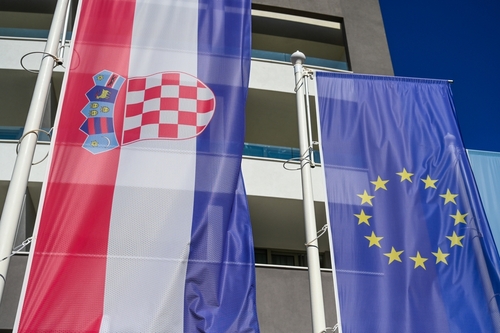
On January 1st, 2023, Croatia joined both the Eurozone and Schengen area. This means that from now on, Croatians will be using the euro as a currency and will not encounter checks at internal borders with other countries in the Schengen area.
In fact, checks at internal land and sea borders between Croatia and the other countries in the Schengen Area have already been removed, although checks at internal air borders won’t be lifted until 26 March 2023 to coincide with the dates of the International Air Transport Association (IATA) summer/winter time schedule.
According to a press release published at the European Commission’s website, this is an important milestone in the history of Croatia that comes after a period of “intensive preparation and substantial efforts by Croatia to meet all the necessary requirements”.
Actually, Croatia spent several years in the Schengen evaluation process (from 2016 to 2020). After it showed that it applied all the Schengen rules in accordance with the agreed common standards and with fundamental principles, the European Commission declared that Croatia met all the conditions to join the Schengen area.
The European Council came to the same conclusion in December 2021, but the addition of new members to the Schengen area requires an unanimous decision that didn’t come until 8 December 2022.
The European Commission had urged the Council to allow the full participation of Croatia in the Schengen area in a communication from 16 November 2022.
On the other hand, Croatia’s entry into the Eurozone was supported by the European Commission (which concluded that Croatia met the criteria for adopting the euro in its 2022 Convergence Report), by the European Central Bank (which concluded the same thing in its own Convergence Report), and by the EU Finance Ministers (who took the formal decisions to allow Croatia’s adoption of the euro).
From January 1st, 2023, the euro will gradually replace the Croatian kuna at a conversion rate of 1 euro for 7.53450 Croatian kuna.
The Croatian National Bank has already supplied commercial banks with euro cash, which in turn have supplied euro cash to shops and businesses.
Kuna cash can be exchanged for euro cash at the Financial Agency and post offices until 30 June 2023 and at commercial banks until 31 December 2023. The exchange will be free of charge until 30 June 2023 up to a limit of 100 kuna banknotes and 100 kuna coins.
People can also exchange kuna banknotes without a time limit and kuna coins until 31 December 2025 at the Croatian National Central Bank for free.
Additionally, automatic teller machines (ATMs) in Croatia will deliver euro banknotes (70% at the time, and the rest as soon as possible within two weeks).
“The euro will bring great economic and social benefits to Croatia’s people and businesses. It will lower barriers for companies, reduce costs for importers and exporters – leading to more choice and better prices for consumers. Together with Schengen membership, adopting the euro will give an extra boost to Croatia’s crucial tourism sector”, said Valdis Dombrovskis, Executive Vice-President of the European Commission for An Economy that Works for People and European Commissioner for Trade. “Joining the euro makes countries stronger, more resilient, competitive and prosperous. This is an important step for Croatia to mark its full European integration, and important for the entire European Union”.